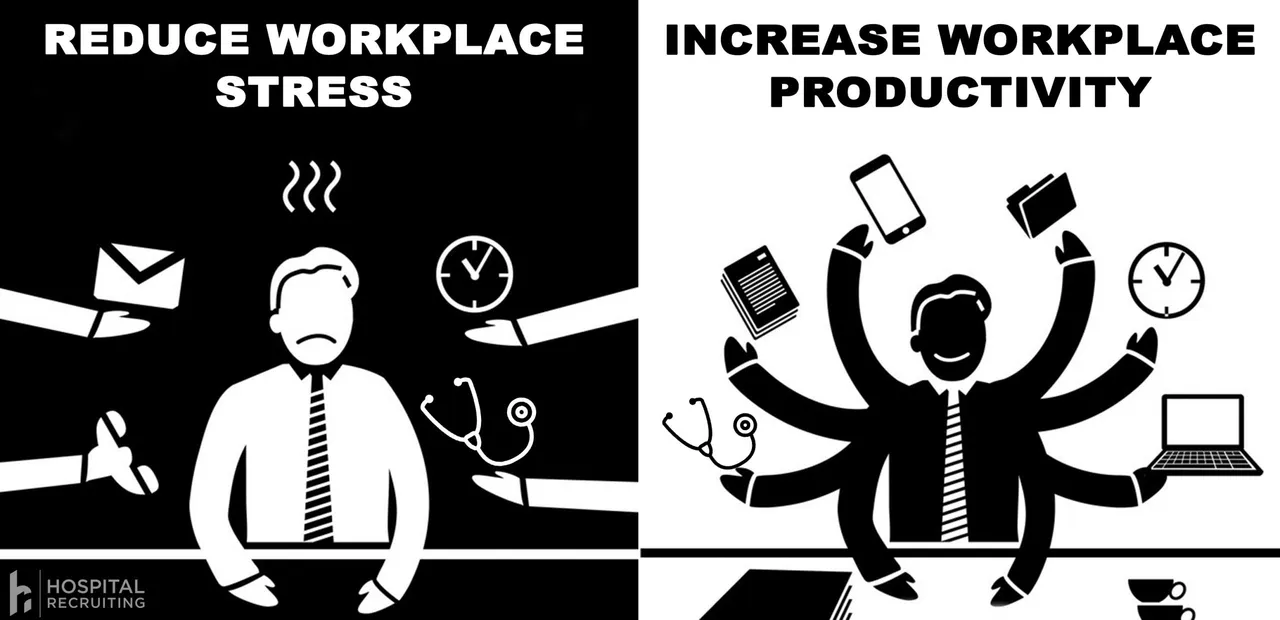Reduce Workplace Stress and Thrive

It is common knowledge that workplace stress impairs employee happiness and contributes to decreased productivity. What’s even more important are the short and long-term health effects that stress has on workers.
Healthcare has never been easy. With COVID, reduced resources, and unpredictability increasing, stress among healthcare workers is rising. There are many risk factors for stressed workers, including addictions, suicide, job dissatisfaction, and lowered levels of client care. Many healthcare workers are tempted to leave the profession.
Stress Reduction and Improved Health is Not a Mystery
Opportunities for learning how to reduce stress are readily available. Many workplaces provide employee assistance programs. Some offer wellness programs. The Internet abounds with opportunities to learn self-care techniques whether it be about eating healthy, exercising, or managing time better.
We all know that balance is essential. Nutritional advice is everywhere. It’s better to move rather than veg out in front of the television or cell phone after work, yet that is precisely what many of us do. Many of us are so exhausted after work and on our days off that we reach for short term, unhealthy solutions that allow us to escape from the stress and fatigue of our jobs.
Break the Cycle of Stress
The issue isn’t lack of knowledge; it is lack of self-care. How do we escape this cycle of job stress, exhaustion, making poor choices, and repeating these activities endlessly?
While there are some specific techniques which you may find helpful, it is essential to realize that managing workplace stress really comes down to mindset and problem-solving. Wavering about making healthy choices doesn’t work. Decide today or on a planned date to implement one healthy behavior into each workday.
The adage that says we need to take care of ourselves before we can take care of others is true. I know taking care of ourselves first may seem impossible. After all, it’s not just workplace stress we’re dealing with. Our lives outside of our jobs are busy and possibly even more stressful than our careers. It's important to relax with your time off, too.
Take a Real Break!
It can be helpful to take a break right after work. This may mean taking 15 minutes to have a cup of tea before starting dinner or helping children.
Many times, work breaks are hurried or complaint sessions. It’s challenging but not impossible to recharge doing a 30 minute lunch break. Consider bringing your lunch and eating outside when the weather is nice.
Would you benefit more from stopping by the chapel garden than sitting in the cafeteria and comparing your woes of the day with colleagues?
If your facility has a break room, is it really conducive to taking a break? Perhaps this is an opportunity that you can take to talk with your colleagues about making the break room a true nest of rest and restoration. Some forward-thinking healthcare facilities are providing booths for workers to relax. While in the booth, workers have access to a hotline and online interactive relaxation meditation or imagery materials.
Give Yourself the Gift of Being Present
Many of us go into an automatic mode when working. While having a routine is efficient, it’s important to stop at times to ground yourself. This can be done by concentrating on each of the five senses. Try the following routine:
• Take a couple of slow deep breaths. Consider carrying a favorite relaxing essential oil such as lavender or jasmine with you. The sense of smell is ancient and is exceptionally grounding.
• Look around you. Notice who is there and if you can see outside. Are there friendly coworkers nearby? What colors do you see?
• Feel the chair supporting your buttocks or the floor beneath your feet. What textures are within your reach?
• Listen. Can you hear your heartbeat even for a moment? Is there quiet for a few seconds?
• Have a mint or other portable treat now and then to awaken your sense of taste while working. During your break, concentrate on the flavors, smells, textures, and taste of your food.
This exercise can be practiced multiple times per day.
Stop and Regroup
When you’re find yourself becoming agitated or begin having familiar negative thoughts, visualize a stop sign. Break your engrained response. Being stuck in a rut solves nothing and only increases your stress level. Consider asking yourself “How important is it?” or “Is there another way I can respond to this?” No one needs to know that you’re regathering yourself. Be as kind to yourself as you are to your patients. Your health matters. You matter.
Related Posts
